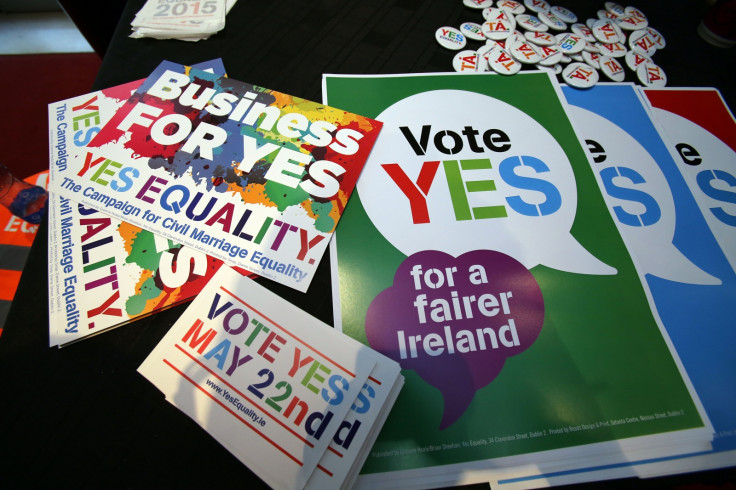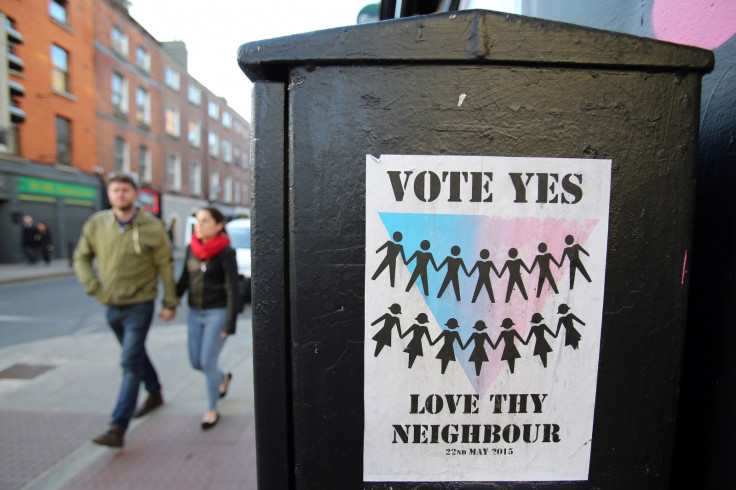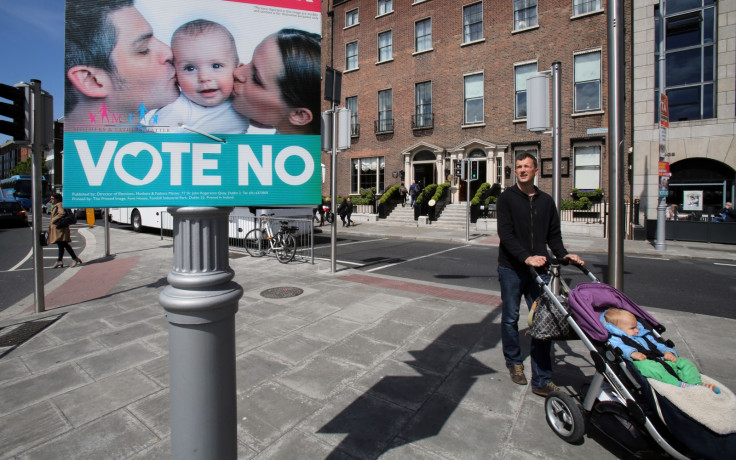Ireland same-sex marriage referendum: Is the Catholic Church's grip on the Irish over?

Ireland could be the first country in the world to approve same-sex marriage off the back of a popular vote this week, in a watershed moment for gay and lesbian rights in the predominantly Roman Catholic country.
Although 85% of the Republic of Ireland's population identify as Catholic, recent polls ahead of the 22 May referendum on whether to legalise same-sex marriage suggest Irish voters are in favour of the change – marking an astonishing turnaround on social attitudes and highlighting the weakening grasp of the church.
A survey of 1,200 voters carried out by the Irish Times showed 58% planned to vote in favour, while 25% planned to vote against and 17% were undecided.
Polls are not always reliable, however. Ahead of the November 1995 divorce referendum, a survey in May put the "yes" vote at over 71%, but divorce barely made it over the line. The final tally, after a recount, was 50.3% in favour of ending the ban on divorce and defying the Catholic Church, while 49.7% opposed the change.
Yet regardless of the outcome of Friday's vote, the decision to hold a referendum on same-sex marriage is a breakthrough for equality. The country has seen great strides taken to achieve LGBT rights, from the first pride march to the first openly-gay politicians.
"Ireland has made huge progress in being a country which values and respects our LGBT population," says Davin Roche, of the Gay and Lesbian Equality Network (GLEN), an Irish NGO. "The referendum has given Ireland a unique opportunity to engage in a national conversation with LGBT people and their fellow citizens. The outcome of the referendum will create a huge milestone in Ireland's journey in accepting and valuing LGBT people as full and equal citizens."

Progress
Although it didn't lead to immediate legal changes, Ireland's first gay pride festival held in Dublin in June 1983 pushed LGBT equality into the Irish mainstream. The march was held in reaction to the killing of a 31-year-old homosexual man called Declan Flynn and the following controversial judgement by the courts, who handed out suspended sentences to the homophobic gang of killers.
Five years later, however, the landmark case of Norris vs Ireland laid the foundations for the eventual decriminalisation of homosexuality. Senator David Norris, who has been credited with single-handedly overthrowing the anti-homosexuality law which brought about the downfall of Oscar Wilde, successfully charged that Ireland's criminalisation of certain homosexual acts between consenting adult men was in breach of the European Convention of Human Rights.
It was this victory which led to the removal of Victorian laws from Ireland's statute book in 1993, which criminalised sexual acts between men. A seminal moment in LGBT rights, it launched a dramatic change in public attitudes towards homosexuality which has continued to this day.
At the end of the 1990s, the publication of Colm Tóibín's Booker Prize-nominated novel The Blackwater Lightship brought the conversation of the global Aids crisis into focus in Ireland. The impact of Aids on literature in the 1980s and 1990s is irrefutable, with writers on both sides of the Atlantic bearing witness to the traumatic phenomenon silently threatening the gay community.
Speaking to the Washington Post ahead of this week's referendum, Tóibín said he believed a "growing tolerance" of homosexuality in Ireland would swing a "yes" vote.
Legal developments continued into the 2000s. In 2010, the Civil Partnership Bill was the first shift towards legalising same-sex marriage, allowing couples to enter into civil partnerships and also giving rights to same-sex couples who had cohabited together.
A year later, the general election brought with it another milestone, with three openly-gay TDs – members of the Dáil Éireann, the lower house of the Irish Parliament – being returned. Progress in political LGBT representation continued into 2015, when Health Minister Leo Varadkar became the first member of government to come out as gay in January.

Public attitudes
Attitudes towards homosexuality have evidently softened in Ireland. But have legal progressions overtaken public attitudes towards same-sex relationships? In February, it was reported that gangs were "catfishing" online to attack gay men and women, luring them into secluded areas in Cork using fake profiles on Tinder, Grindr and Plenty of Fish. A few weeks earlier, a lesbian couple were beaten unconscious by a gang of men in Limerick.
In 2014, a GLEN report found one in three LGBT people in Ireland have been physically or sexually attacked, and half have been harassed in the last five years. Very few incidents are reported to the Gardaí and only 17 attacks were reported to the PULSE system – a computer system used by the police – in 2013.
Homophobic bullying in schools remains an issue, as it does in the UK. A study released on the International Day of Homophobic, Transphobia and Biphobia last week found one in 10 principals in Irish primary schools have to deal with homophobic behaviour on a weekly or monthly basis.
Gay marriage is backed by all the main political parties in Ireland as well as business, who are in favour of a progressive Ireland, but there are significant hurdles to overcome if same-sex marriage is to be given the green light.
The church, which continues to wield tremendous influence over the country, has warned that if the vote passes it may no longer perform the civil parts of a marriage service. This means couples married in a Catholic ceremony would need a separate civil registration.
Yet despite this, the referendum is testament to the social change among people who identify as Catholic. In the mid-1980s, it was reported that nearly 90% of Irish Catholics attended weekly mass. Number began to dwindle in the 1990s and 2000s – in part after clerical scandals rocked the country – and in 2011, it was reported that only 18% Catholics regularly attended church.
This suggests a wide margin between those who identify as Catholic and those who practice. And as Irish voters await the landmark decision, this could make all the difference.
© Copyright IBTimes 2025. All rights reserved.






















